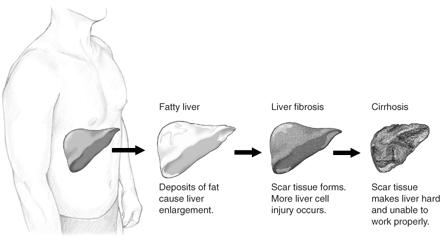12 May Fatty Liver Disease

Fatty liver disease in children, known as nonalcoholic fatty liver disease (NAFLD) is a slow process that occurs over time as fat builds up in the liver. Ultimately, the excess fat leads to damage of the liver, then scarring or fibrosis of the liver, and eventually results in a non-functioning liver or cirrhosis. A child can develop cirrhosis of the liver from excess fat buildup in a similar way that an adult can develop cirrhosis from excess alcohol intake.
Fatty liver disease happens in children who are overweight, obese, or gain too much weight. Fatty liver disease does NOT occur because of too much fat intake, but because of excessive sugar intake. The average child consumes three to four times the amount of sugar their body requires.
How Excessive Sugar Intake Leads to Fatty Liver Disease
Before sugar enters the bloodstream from the digestive tract, it is broken down into glucose and fructose.
- Glucose is found in every living cell, and if we do not get it from the diet, our bodies produce it.
- Fructose is different. Our bodies do not produce any significant amount of fructose because there is no physiological need for it. Fructose can only be metabolized by the liver. This is not a problem if we eat a small amount of fructose, such as from fruit. Eating extra fructose will overload the liver and force the liver to turn the fructose into fat. Repeatedly eating large amounts of sugar will lead to fatty liver disease.
Symptoms of Fatty Liver Disease
The symptoms of fatty liver disease vary depending on the stage of the child’s disease. Some symptoms include:
- Fatigue
- Abdominal pain
- Increased liver enzyme levels in the blood
Diagnosis of Fatty Liver Disease
To diagnose if your child has fatty liver disease, the following tests may be performed:
- Blood tests including liver enzymes
- Liver ultrasound
- Liver biopsy
Treatment of Fatty Liver Disease
There is currently no proven medicine to treat fatty liver disease in children. Children benefit most from stopping their weight gain and, in some cases, losing weight. Children and their families should follow key healthy nutrition and diet behaviors:
- Avoid sugar drinks
- 60 minutes of some form of physical activity every day, such as playing outside
- Limiting TV and screen time to one hour or less per day
- Make half the mealtime plates filled with vegetables
- Not skipping meals
If you would like more information about gastrointestinal (GI) digestive disorders and nutrition in children, please contact Dr. Mona Dave’s Frisco Office or Request Appointment Here.
